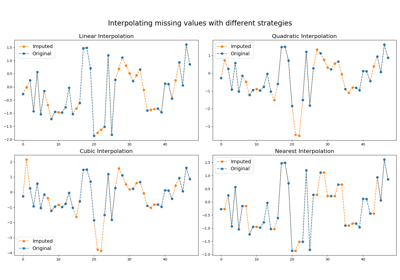pyts.preprocessing.InterpolationImputer¶
-
class
pyts.preprocessing.InterpolationImputer(missing_values=nan, strategy='linear')[source]¶ Impute missing values using interpolation.
Parameters: - missing_values : None, np.nan, integer or float (default = np.nan)
The placeholder for the missing values. All occurrences of missing_values will be imputed. If an integer or a float, the input data must not contain NaN or infinity values.
- strategy : str or int (default = ‘linear’)
Specifies the kind of interpolation as a string (‘linear’, ‘nearest’, ‘zero’, ‘slinear’, ‘quadratic’, ‘cubic’, ‘previous’, ‘next’, where ‘zero’, ‘slinear’, ‘quadratic’ and ‘cubic’ refer to a spline interpolation of zeroth, first, second or third order; ‘previous’ and ‘next’ simply return the previous or next value of the point) or as an integer specifying the order of the spline interpolator to use. Default is ‘linear’.
Examples
>>> import numpy as np >>> from pyts.preprocessing import InterpolationImputer >>> X = [[1, None, 3, 4], [8, None, 4, None]] >>> imputer = InterpolationImputer() >>> imputer.transform(X) array([[1., 2., 3., 4.], [8., 6., 4., 2.]])
Methods
__init__(self[, missing_values, strategy])Initialize self. fit(self[, X, y])Pass. fit_transform(self, X[, y])Fit to data, then transform it. get_params(self[, deep])Get parameters for this estimator. set_params(self, \*\*params)Set the parameters of this estimator. transform(self, X)Perform imputation using interpolation. -
__init__(self, missing_values=nan, strategy='linear')[source]¶ Initialize self. See help(type(self)) for accurate signature.
-
fit_transform(self, X, y=None, **fit_params)¶ Fit to data, then transform it.
Fits transformer to X and y with optional parameters fit_params and returns a transformed version of X.
Parameters: - X : numpy array of shape [n_samples, n_features]
Training set.
- y : numpy array of shape [n_samples]
Target values.
- **fit_params : dict
Additional fit parameters.
Returns: - X_new : numpy array of shape [n_samples, n_features_new]
Transformed array.
-
get_params(self, deep=True)¶ Get parameters for this estimator.
Parameters: - deep : bool, default=True
If True, will return the parameters for this estimator and contained subobjects that are estimators.
Returns: - params : mapping of string to any
Parameter names mapped to their values.
-
set_params(self, **params)¶ Set the parameters of this estimator.
The method works on simple estimators as well as on nested objects (such as pipelines). The latter have parameters of the form
<component>__<parameter>so that it’s possible to update each component of a nested object.Parameters: - **params : dict
Estimator parameters.
Returns: - self : object
Estimator instance.


